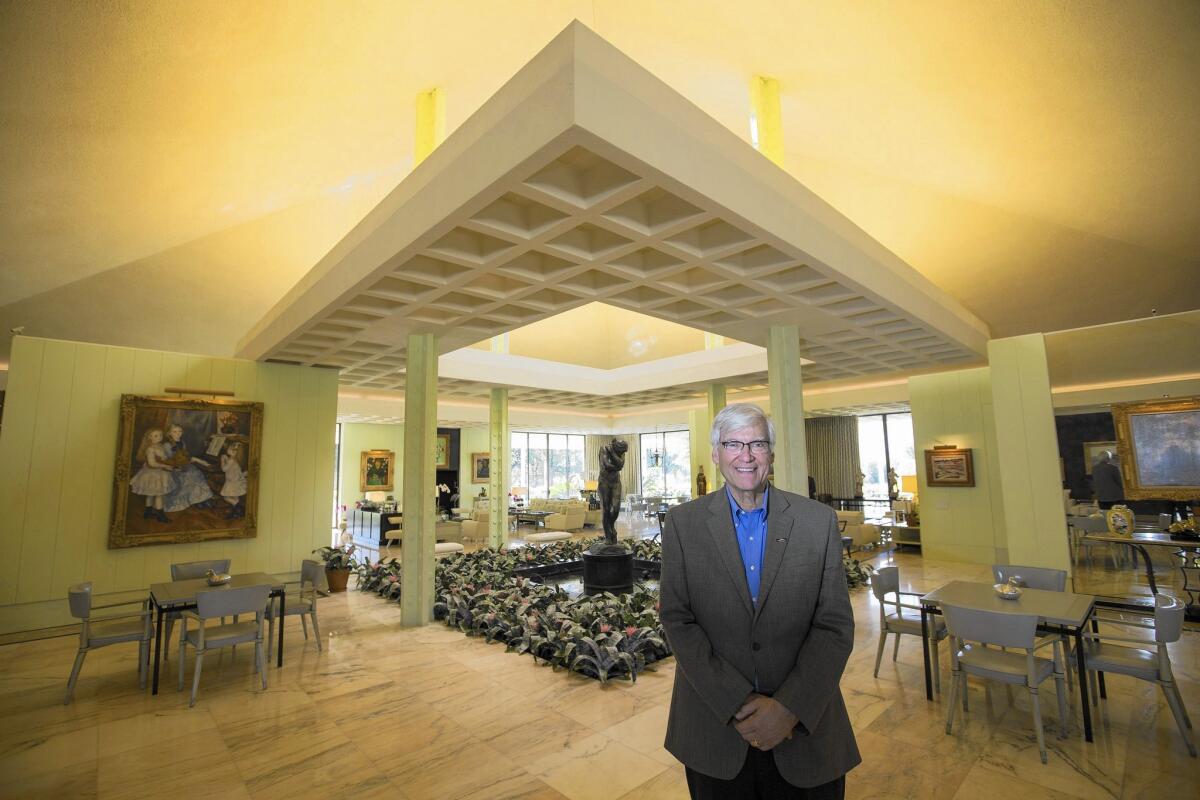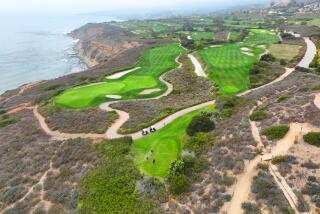Reagan in slippers. Sinatra by the pool: Inside Sunnylands, the Camp David in California’s desert

- Share via
RANCHO MIRAGE — When President Obama and leaders of Asian nations meet here Monday they will feel the tug of history and a bit of glamour on an estate where Ronald Reagan wandered around in slippers, Frank Sinatra sipped drinks by the pool and Dwight D. Eisenhower suggested that the nine-hole golf course could use a few palm trees.
The Sunnylands retreat of late billionaire Walter H. Annenberg and his wife, Leonore, has become a grand setting for casual diplomacy and sunburned caddies — a western version of Camp David that concentrates on the Pacific Rim.
Obama has met here with Chinese President Xi Jinping and King Abdullah II of Jordan, discussing matters ranging from world trade to global warming. Like the desert that surrounds it, the 200-acre estate is at once opulent and rustic, a relaxed getaway of position papers, advisors and olive trees that stretch toward the San Jacinto Mountains.
SIGN UP for the free Classic Hollywood newsletter >>
“I want people to feel on one hand that it’s a wonderful place to be,” said Geoffrey Cowan, president of the Annenberg Foundation Trust at Sunnylands, which oversees the 25,000-square-foot home and its surrounding grounds. “You can play golf or walk or ride bikes with whoever. But at the same time it’s a place where something important is going to take place. To have that blend is the challenge that we’ve tried to meet.”
Obama’s summit Monday with leaders from the Assn. of Southeast Asian Nations comes at a time of regional tensions, including containing North Korea’s nuclear ambitions and disputes over Beijing’s territorial claims in the South China Sea. The meeting, which will not include China, is a move by Obama to reaffirm U.S. commitment to Asian nations wary of Beijing’s regional aggressiveness.
The summit’s serene setting evokes more than a hint of wealth and the brand of power that drove American politics from the post-World II era through the Cold War. The winter home of the late Annenbergs, Sunnylands, open for public tours, was built in the mid-1960s and rises on a swath of desert in Rancho Mirage that became known as a Republican playground.
The estate’s mix of paintings by Renoir and Van Gogh with sculptures from China’s Tang Dynasty adds a degree of cultural diplomacy — the essence of soft power — to deliberations.
Designed by architect A. Quincy Jones and considered a classic of Midcentury Modern design, the home conjures a “Mad Men”-style allure with a Portuguese marble floor, a statue of Rodin’s “Eve” and walls of black-and-white photographs of industrialists, politicians and celebrities who one imagines listened to Sinatra’s “Summer Wind” while discussing contracts, cigars and distant calamities.
Walter Annenberg made his fortune in publishing and was an ambassador and philanthropist; Leonore served as chief of protocol under Reagan. They were the consummate couple of money and politics: Reagan and his wife, Nancy, spent 18 New Year’s Eves here, often sleeping in single beds in a yellow room near a transistor radio and a couch pillow embroidered with the saying “Superior people never make long visits.”
Richard Nixon knew his way around the grounds, as did Kirk Douglas, Gregory Peck and Prince Charles. Throughout its history the home has been at once patrician and folksy, a scrapbook of images that shaped and defined the times, from a photograph of Reagan wearing a sweater and slippers while watching a console TV as Soviet leader Mikhail Gorbachev addressed the American people, to Obama strolling the trimmed lawns with Xi to improve relations with China in an era of shifting world orders.
Cowan, leaving his post in June after six years, has helped shape Sunnylands’ diplomatic atmosphere. The director of the Annenberg Center for Communication Leadership & Policy at USC, Cowan registered black voters and helped organize the Mississippi Freedom Democratic Party in 1964. Four years later, he was key to reforming the process of selecting delegates in presidential primaries.
Sitting in his office the other day, Cowan, also a professor at USC, spoke of the seminal political figures who strolled the grounds over the decades.
“How do you build on a legacy like that and make it relevant to today and for the future both in terms of what you are as a beautiful location, a kind of museum and gardens and also as a place that can project messages to the world?” said Cowan, 73, who has the soothing voice of a midnight jazz DJ. “How can I use this incredible gift the Annenbergs gave us to make something good happen?”
Among the ambitions of the Annenberg trust, he said, is to build bipartisanship at home, strengthen international ties, notably with Pacific Rim nations, and to become a “model of (environmental) sustainability” at a time of climate change and California drought. He noted that Obama’s discussions here with Xi on hydrofluorocarbons factored into a wider climate-change agreement.
A desert estate with a nine-hole golf course and 11 man-made lakes raises questions of conservation and privilege. Cowan said that to save water the estate has reduced the number of its cultivated acres to 120, let its fairways fade to brown and seeded only 10 acres this season of winter-rye grass. To further justify its use of water, the estate is producing olive oil from its more than 600 olives trees, which dot the grounds with cactus, eucalyptus and oak.
“Sunnylands is the Camp David of the American West but with better weather and a more spectacular setting,” said Karl W. Eikenberry, a former U.S. ambassador to Afghanistan and now director of the U.S.-Asia Security Initiative at the Shorenstein Asia-Pacific Research Center at Stanford University. He added that the grounds are “a relaxed, uniquely American environment, allowing the participants to get to know each other and engage in serious unscripted conversations.”
Cowan is inclined toward the unscripted and the politically revealing. His new book, “Let the People Rule: Theodore Roosevelt and the Birth of the Presidential Primary,” examines the politics and racial attitudes that influenced one of the nation’s most popular presidents. The story resonates today in a country still unsettled by racial suspicions and divides. He spoke of the civil rights years of the 1960s, which formed much of his political philosophy and his insistence that the retreat make respecting a diversity of ideas “a hallmark of this place.”
Sunnylands is “beautifully branded” for Pacific Rim negotiations, said Orville Schell, the Arthur Ross Director of the Center on U.S.-China Relations at Asia Society in New York. “In the minds of the Chinese it became the Bethlehem of U.S.-China relations. It’s almost like the Holy Land. Anything that takes place there with the Chinese gets a curious blessing.”
When it’s not being used for international summits, Sunnylands is a tourist attraction. More than 80,000 people visited Sunnylands in 2014-15, many of them Chinese who have been drawn since Xi’s 2013 visit.
The Sunnylands Center & Gardens is open free to the public from Thursdays through Sundays. Those who also want to tour the Annenberg home and its Mayan-influenced architecture pay a $40 fee and must buy tickets two weeks in advance.
Visitors can glimpse the fireplace Sinatra stood next to in 1976 when he married his fourth wife, Barbara. They can also wander into the Room of Memories, crammed with photographs and a portrait of Annenberg by Andrew Wyeth. The Impressionist and Post-Impressionist paintings, however, are digital representations — the originals were donated to the Metropolitan Museum of Art in New York.
When presidents and leaders arrive, after weeks of advance teams and security preparations, the tourists are nowhere in sight and the staff, including Cowan, disappears as statecraft begins and Obama, an avid golfer, looks out over the fairways.
“I call myself the innkeeper,” said Cowan. “I met him [Obama] as did a couple of trustees who were here to greet him, and turned over the keys.”
Twitter: @JeffreyLAT
ALSO
That time the president came to Los Angeles...
Analysis: GOP brawl in South Carolina may have repercussions in the general election
Shari Redstone will play a key role in what happens to Paramount, MTV and CBS
More to Read
The biggest entertainment stories
Get our big stories about Hollywood, film, television, music, arts, culture and more right in your inbox as soon as they publish.
You may occasionally receive promotional content from the Los Angeles Times.











